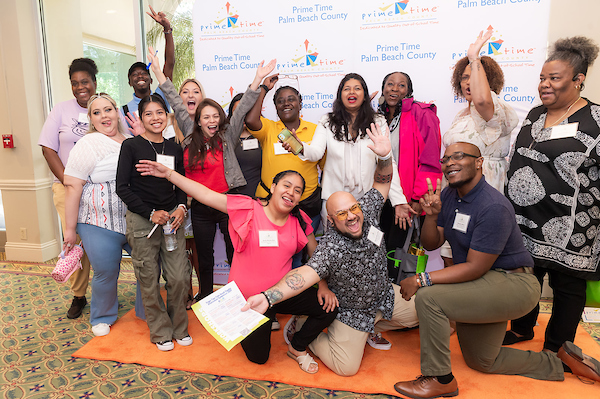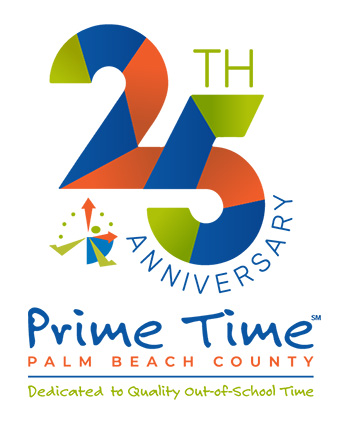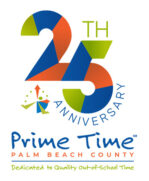Integrating Well-being and Life Skills in Your Afterschool Program
Well-being has become fundamental to learning, thriving, and succeeding in life. Well-being is cultivated through the strengthening of resiliency and life skills. Studies show that when youth name, notice and reflect on their experiences, thought and emotion processes, behaviors and social interactions in a positive environment, they are better equipped to proactively respond to challenging life situations, more ready to learn and better able to perform in educational and work settings.
Prime Time Palm Beach County’s Well-being and Life Skills Initiative is an innovative professional learning opportunity designed to build resiliency and life skills among children and youth in afterschool based on best practices in the field and in alignment with national and state health and resiliency standards. This new initiative is focused on building an afterschool climate and culture whereby youth thrive physically, mentally, emotionally, and socially, succeed in academic and extracurricular endeavors, build more positive and productive relationships, and engage in acts of kindness and service to others.
Register for Well-being and Life Skills Training Series
Well-being has become fundamental to learning, thriving, and succeeding in life. Well-being is cultivated through the strengthening of resiliency and life skills. Studies show that when youth name, notice and reflect on their experiences, thought and emotion processes, behaviors and social interactions in a positive and accepting environment, they are better equipped to proactively respond to challenging life situations, more ready to learn and better able to perform in educational and work settings.
This spring we are pleased to offer Prime Time Palm Beach County’s Well-being and Life Skills Initiative, an innovative professional learning opportunity designed to build resiliency and life skills among children and youth in afterschool based on best practice in the field and in alignment with national and state health and resiliency standards. Together, we focus on building an afterschool climate and culture whereby youth thrive physically, mentally, succeed in academic and extracurricular endeavors, build more positive and productive relationships, and engage in acts of kindness and service to others.
Participating programs will receive:
- Specialized professional learning and coaching supports to explicitly embody and model adult well-being and teach youth resiliency and life skills to K-5 groups in afterschool
- In-person observations and on-demand coaching to successfully integrate well-being and life skills in your daily routine
- Resilient Leadership Academy with advanced cross-site community of practice peer problem-solving labs for successful ongoing implementation
- Resource bag with Afternoon Meeting curricula, lesson-planning tools plus free access to the Inner Explorer mindfulness practice application
- Training stipends (up to $255) and up to 2.4 CEUs upon successful completion of training requirements
Participants are REQUIRED TO ATTEND ALL TRAININGS in the series, complete an observation and a coaching session at their program site and assignments in between trainings.
By registering for this initiative, you are committing to all training session dates.
The following is a schedule of the professional development trainings for the Well-being and Life Skills Fall cohort.
Training Schedule is hybrid with two in-person sessions.
Well-being and Life Skills Series
All trainings are from 9 a.m. - 11 a.m.
- Part 1 – Introduction to Well-being: February 24, 2026
- Part 2 – Growing into My Best Self: March 3, 2026
- Part 3 – The Art of Social Connection: March 10, 2026 (IN PERSON)
- Part 4 – Responding to Stress Trauma and Uncertainty: March 17, 2026 - SPRING BREAK
- Part 5 – Making Resiliency a Habit: March 31, 2026
- Part 6 – Empathetic Communication, Strong Relationships: April 7, 2026
- Part 7 – Building a Culture of Compassion: April 14, 2026
- Part 8 – Expressing Gratitude and Serving the Community: April 21, 2026 (IN PERSON)
Resilient Leadership Academy (Directors and Assistant Directors only)
- Session 1: Leading from Within – Thursday, January 29, 2026
- Session 2: Leading with Compassion – Tuesday, April 28, 2026
*Prerequisite: Resiliency and Life Skills Basics Onboarding self-paced online training.
Well-being and Life Skills Series Training Objectives:
- Cultivate foundational understanding of resiliency and life skills and the science-based benefits for adults and youth.
- Practice and reflect on adult-focused well-being practices in intrapersonal and interpersonal contexts.
- Learn, apply, and plan lessons and strategies of the responsive classroom approach to afternoon meeting and best practice for resiliency and life skills instruction to youth in afterschool settings.
- Explore innovative ways to create a positive and welcoming climate and culture through integration of well-being, resiliency and life strategies in staff interactions and youth activities.


Contact
knellee bisram
Well-Being and Life Skills Specialist
561-244-5119
kbisram@primetimepc.org
What is Afternoon Meeting?
The Afternoon Meeting is the out-of-school time complement to the Morning Meeting that helps to ensure continued well-being and life skills are being built with a 7 a.m. to 7 p.m. focus. Morning/Afternoon Meeting is an interactive group practice that teaches explicit well-being and life skills to youth. The Afternoon Meeting, like the Morning Meeting, entails an intentional circle gathering where the adult models and facilitates four activity segments, namely, the Greeting, the Sharing, the Activity and the Message.
Each segment is designed to:
- incrementally build positive adult-youth and youth-youth communication and interaction,
engage youth in positive behavior, - provide opportunities for adult and youth to build well-being and life skills,
- promote fairness and leadership opportunities by giving youth voice and choice during meeting activities,
- create explicit connections between well-being and life skills and academic learning.
The Afternoon Meeting also provides an opportunity to apply signature Well-being and Life Skill practices that teach youth how to transition their hearts and minds from one activity to another so that these practice may become more integrated across the out-of-school time program.

